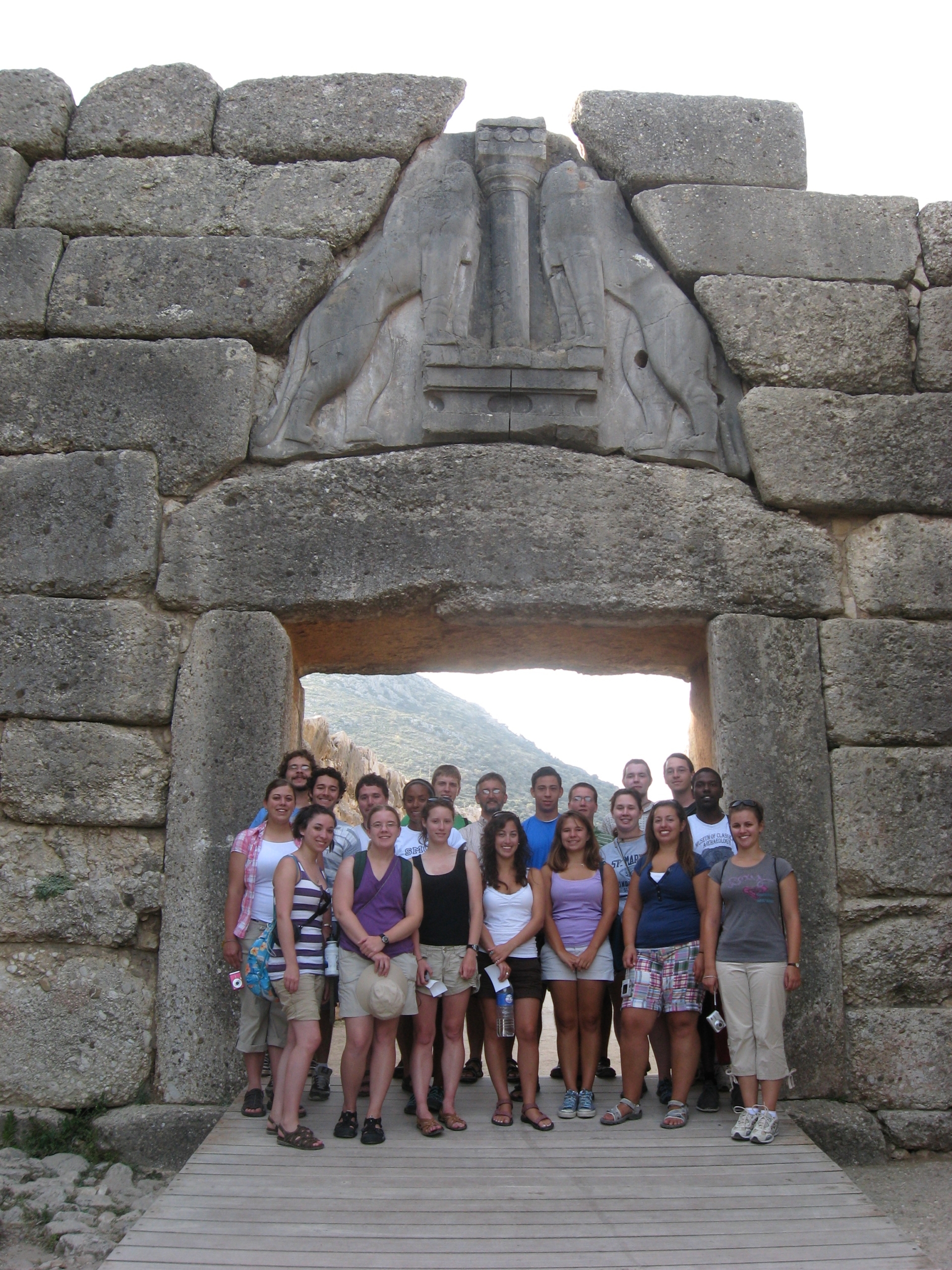
SMCM Greece Study Tour students at Mycenae.
Pre-Requisites
- Minimum GPA: 2.0
- Judicial Check
- Academic Conduct Review
Dates and Important Links
- Summer 2025: Estimated Dates: June 3- 23, 2025
- Link to Full Greece Study Tour website
- UPDATED DEADLINE: Apply on Via TRM! by JANUARY 1, 2025
- Info Sessions:
- Monty 101 – Friday, 9/20 11:45am-12:30pm
- Monty 101- Monday, October 21, 11:45am -12:30pm
- Monty 101-Tuesday, 12/3, 11:30am-12:10 pm
- ZOOM: 12/18 1 pm
Highlights
- Stay in Ancient Korinth, Nauplio, Athens, and more!
- Visit the island of Kythera!
Study Abroad Budget
- Estimated Program Cost: $5400 Program Fee + 4 credits tuition cost (see below)
About the Program
This course satisfies the cultural literacy requirement.
The 2025 Greece Study Tour (INTL330) will be the fifteenth run by Professors Michael Taber and Inbal Cohen, Department of Philosophy and Religious Studies at St. Mary’s College of Maryland, offering participants (whether current students at any university, alumni, or just people who’ve wanted to see this amazing land–we’ve had all of the above) an opportunity to gain a first-hand understanding of the layering of history in this part of the world.
This course can often be used to fulfill one of the following St. Mary’s course requirements (4 credit-hours):
ENGL 380–Studies in World Literature: Greece Study Tour
ENST 380-Topics in Environmental Studies: Greece Study Tour
HIST 393–Topics in European History: Greece Study Tour
PHIL 380–Topics in Philosophy: Greece Study Tour
RELG 380–Topics in Religious Studies: Greece Study Tour
WGSX 350–Advanced Topics in Women, Gender, and Sexuality Studies: Greece Study Tour
TFMS 405-Topics in Performance Studies: Greece Study Tour
The course can also be used to satisfy the requirements of the Democracy Studies area, in consultation with the Coordinator of Democracy Studies, for what would be either HIST 393 or RELG 380 (which are on the list of DMST-satisfying courses), or as the four credits normally satisfied by independent study, internship, or directed research.
Which course the student takes this as should determine the content and methodology of the student’s term paper, which is 8-12 pages and due well after the trip, August 1. Where possible, it should also determine the student’s selection of a site paper and site report, and of the two Who’s Who oral reports.
Regardless of how one registers for the study tour, any cultural literacy or ELAW-related learning outcome for the course is that at the completion of this course, students will be able to explain the impact of place and context on their understanding of specific course materials and experiences.
Students from other institutions should contact Professor Taber to get information from him relevant to getting pre-approval from their home institutions for transfer upon completion.
For Whom is This Study Tour Right?
We’ve had majors from Anthropology, Art, Art History, Biology, Computer Science, Economics, Education, English, Foreign Languages, History, Math, Musical Theater, Philosophy, Physics, Political Science, Psychology, Religious Studies, Sociology, and Theater, Film, & Media Studies. (And I might be forgetting a couple.)
We’ve had students who went on to med school (we have some lessons on Ancient Greek medicine) and law school (we have some lessons on the Ancient Greek and Roman legal systems).
We’ve had people who are NOT students, but were students a couple of weeks prior to the trip (a nice graduation present!) or last were students decades and decades ago.
So for students, one’s major is not a consideration. And for others, nor is one’s life stage. What IS a consideration is interest in learning more about this part of the world in the context of a warm and welcoming group of fellow learners.
About the Trip
A study tour is not simply an off-campus course. Not only do you get to see sites, structures, and landscapes that directly relate to our readings, but you learn that our image of Greece must extend beyond silent, weather-worn limestone foundations and pages in literally inanimate books. Greece has lived in dozens of centuries, and is still very much alive. Please note: this is a credit-bearing academic course.
Accommodations
Our long-time Greek travel agents, the Cocconi family at Educational Tours and Cruises, have arranged for us to stay in some memorable inns and hotels, all with standard amenities. for more details.
Faculty Leader
Michael Taber, mstaber@smcm.edu
Transfer Credit Policy
How credits taken abroad will transfer back to SMCM.
Academic and Judicial Policies
The academic and judicial requirements for any student considering studying abroad.
Financial Aid and Scholarships
How financial aid will apply towards your study abroad program and what scholarships are available.
Payments and Services
Payment processes for semester-long, short-term, and non-SMCM study abroad programs.
